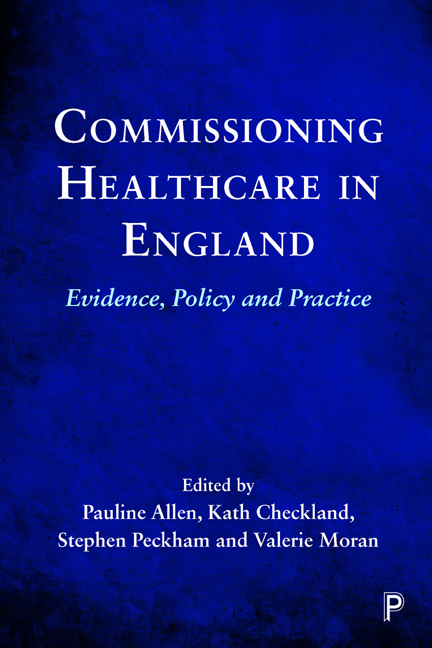Book contents
- Frontmatter
- Dedication
- Contents
- List of Figures and Tables
- List of Abbreviations
- Notes on Contributors
- Acknowledgements
- 1 Introduction
- 2 Context: Commissioning in the English NHS
- 3 The Development and Early Operation of Clinical Commissioning Groups (CCGs)
- 4 Clinical Engagement in Commissioning: Past and Present
- 5 Commissioning Primary Care Services: Concepts and Practice
- 6 Commissioning of Healthcare Through Competitive and Cooperative Mechanisms Under the HSCA 2012
- 7 Healthcare Contracts and the Allocation of Financial Risk
- 8 The Changing Public Health System: an Examination of the new Commissioning Infrastructure
- 9 Conclusion
- References
- Index
9 - Conclusion
Published online by Cambridge University Press: 03 March 2021
- Frontmatter
- Dedication
- Contents
- List of Figures and Tables
- List of Abbreviations
- Notes on Contributors
- Acknowledgements
- 1 Introduction
- 2 Context: Commissioning in the English NHS
- 3 The Development and Early Operation of Clinical Commissioning Groups (CCGs)
- 4 Clinical Engagement in Commissioning: Past and Present
- 5 Commissioning Primary Care Services: Concepts and Practice
- 6 Commissioning of Healthcare Through Competitive and Cooperative Mechanisms Under the HSCA 2012
- 7 Healthcare Contracts and the Allocation of Financial Risk
- 8 The Changing Public Health System: an Examination of the new Commissioning Infrastructure
- 9 Conclusion
- References
- Index
Summary
The period since the passing of the HSCA 2012 has been one of change and disruption for the NHS and at the time of writing in 2019 it seems unlikely that this turbulence will diminish in the near future. While the LTP (NHS England and NHS Improvement, 2019) published in January 2019 provides some indication of the future direction of commissioning, the lack of specific detail and guidance leaves the Plan open to interpretation. The main thrust of the LTP is to increase the emphasis on collaboration and integration at local level at the expense of competition, but its provisions about commissioning itself are not clear. The structural changes introduced by the HSCA 2012 pursuant to the twin policies of increasing clinical involvement in commissioning and accelerating market forces have had large effects on the practice of commissioning across the NHS. The government also emphasised the need for local freedoms to determine how services should be delivered in relation to the choices and needs of patients and greater public and democratic accountability (Department of Health, 2010a). In addition, while the focus of less attention, the shift of public health from the NHS to LAs discussed in Chapter 8 has also had a profound effect on the commissioning and delivery of services. The broad range of PRUComm's research projects has revealed a series of common themes, which are also found in other research on developments during this period.
As highlighted in previous chapters, since the introduction of changes following the HSCA 2012 there has been a large increase in the complexity of health system governance. The number of bodies undertaking commissioning has increased in two ways: NHSE, PHE and LAs all have a role in commissioning aspects of health care, in addition to CCGs, which were the successor to PCTs; moreover, CCGs are smaller organisations than PCTs so there are many more of them. While the shift to CCGs and LA commissioning appears to fit with the White Paper's language of localism and decentralisation, freeing local commissioners from central control, the reality has been somewhat more mixed.
- Type
- Chapter
- Information
- Commissioning Healthcare in EnglandEvidence, Policy and Practice, pp. 143 - 152Publisher: Bristol University PressPrint publication year: 2020



